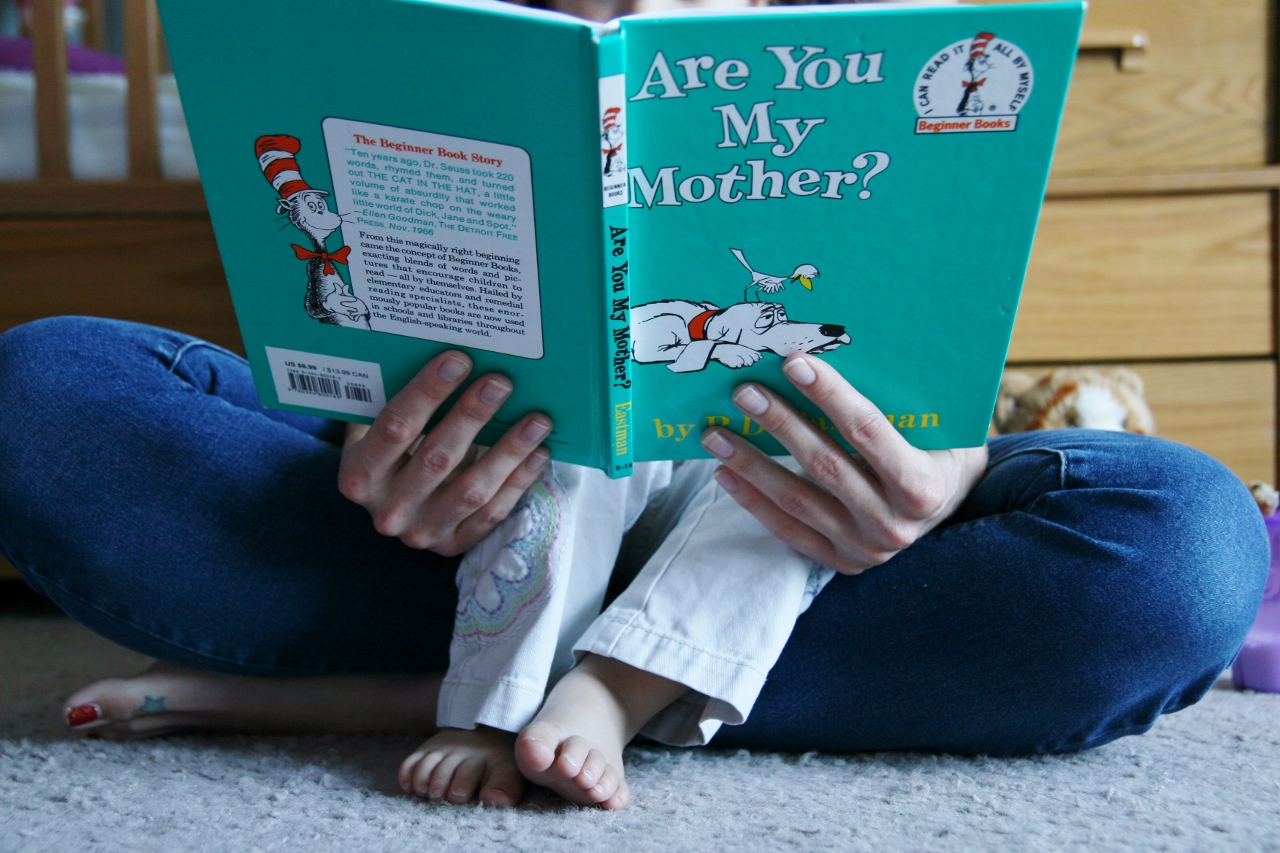
By Anna Anderson
It’s a Sunday morning and I’m sitting in a church, in a row very near the back, not far from the door. I like to sit near the back in church services and yoga classes in case I need to make a quick escape. Vulnerability looms larger in these settings, and I’m always nervous someone will decide I’m actually a fraud, and I shouldn’t be allowed to take communion or execute downward-facing dogs. This is irrational, I know.
The church is small and meets in a gym that belongs to a larger church. The doors are swung open to the mid-morning sunlight. A picture of Jesus hangs near the altar. He has a long, narrow nose and a down-turned mouth and he gazes at his flock with stoic indifference.
The priest’s reassuring voice leads us through the Prayers of the People. She prays for the poor and the sick and the imprisoned. “Lord, hear our prayer,” we all chime in at the conclusion of each request.
A shaggy-haired blonde child, about two and a half years old, is seated six rows ahead of me. He turns around. We lock eyes. I smile. His eyes light up. A feeling of validation washes over me. I’m not a mother, and the further I get into my thirties, the more I fear motherhood will elude me indefinitely. And so I’m flooded with relief any time I earn even fleeting approval of children. I take it as proof that I could be a mom, that I’d be a natural.
The child points in my direction. “Mommy!” he says. I look around to see who his mother is. The row is empty except for me. The child ducks under some legs and scurries toward the back of the church, toward me. He shimmies through the metal folding chairs until he is right next to me, wrapping his arms around my legs with an affectionate familiarity. I’m a little unsettled because the kid is a stranger to me. I freeze, waiting for his parents to come whisk him away. No one comes.
We finish the Prayers of the People and I gingerly sit down. He crawls into my lap. He’s pretty at ease around me, so I start to loosen up too. I let my heart melt just a little. His curls brush against my neck as he adjusts his toddler form into a more comfortable position, his head on my shoulder. I look down at the tiny adorable stranger in my arms, completely bewildered, wondering why has he chosen to bestow his affections on me, a strange lady.
“Mommy, do you have any snacks?” Wait. This kid really thinks I’m his mom. I take a mental step back to examine my hold on reality. Potential explanations for what is happening here:
1) I’m suffering from amnesia and don’t remember that I’m a mom.
2) I’ve entered an alternate dimension in which I am, in fact, a mom.
3) I’m hallucinating.
4) Noting my biological clock, God has simply dropped a child out of Heaven for me.
5) The kid is confused.
I assume it’s option #5. Which means I have a choice to make: I can correct him, or I can go with it. If I correct him, I risk him feeling some sort of misplaced maternal rejection, which could be quickly remedied if I just knew which mother to shuttle him toward. But I do not. If I go with it, his sense of alienated disorientation will only increase once he finally realizes I’m actually a stranger, not his mom. Both seem like potential Freudian nightmares.
But I know what I want. I want to go with it. I want to assuage, if even temporarily, the fear that motherhood will elude me indefinitely. I want to quench my maternal thirst. I want to sink deep into the mother-child blond like a sugar fiend taking a spoon to a can of frosting in the middle of the night.
“No snacks,” I whisper.
He sighs deeply and twists his neck around to look at me. “Mommy, can we go home?”
“Not yet,” I say.
The priest is breaking the bread: “The gifts of God for the people of God.” I carry him in my arms up to the altar for communion. No one stops me. I actually feel like a mom. And it’s wonderful.
The child plays with my purse straps while the priest gives the benediction. My heart grows tentative, knowing I won’t be a mom for much longer. My thirty-five minutes is almost up.
A tall man who’s been playing music for the service at the front of the gym approaches me. “Sorry,” he says, “his mom’s home sick today.” He chuckles. “You look a lot like her.” The child looks up as the realization hits him. He bursts into tears. I feel terrible.
“You see! I’m a fraud!” I want to yell. Instead, I give a nice smile and say, “No problem. We had a nice time.”
•••
The reality is that I live in Los Angeles. The reality is that I live alone. The reality is that I have no husband, no children. But I act in TV commercials and so, on occasion, live outside of that reality.
Some commercial producers have decided I don’t look like a single woman in LA at all. In fact, I look like a woman living in suburban Nashville with two kids and a husband, the kind of woman who might spend her vacation days at a place like Dolly Parton’s Tennessee theme park, Dollywood. And since they’re offering money for this down-home interpretation of my likeness, I pack up my bags and head to Nashville to shoot.
In Nashville, I have a blonde son and a redheaded daughter. My husband is burly and bearded and looks nothing like anyone I have ever dated. They give him a snug winter-white sweater to wear, which makes him look like a gruff Bing Crosby. They give me a denim skirt and a button-up blouse with a vaguely Western motif. The director is going for Wes Anderson quirk. The client and ad agency are going more Smoky Mountain-chic. The result lies uncomfortably in between.
In the suburban house where we film, there’s a framed painting of a Confederate soldier and a guitar signed by Alan Jackson. I change in the gun closet.
When the kids are taken to set, my husband and I follow them downstairs to watch. The process is agonizingly slow. The girl doesn’t take direction well. The director is visibly frustrated. My husband leans over and snorts, “This is why W.C. Fields said never to work with children or animals.” We go back upstairs where I manage to fit in two naps on the overstuffed couch.
I keep wondering when they’ll bring all of us together to film the big reveal scene—me, my husband, and my kids. But it never happens. As soon as my husband and I are shuttled on set, our kids are shuttled away. We never film with them at all. But in the edited version of the commercial, the four of us are all in the living room together. The four of us are happy. We look like a real family.
•••
It’s two in the morning and I’m sitting with my boyfriend in my Honda at the foot of his driveway. Technically, he’s not my boyfriend, but he was at one time, and we’ve been attempting over the past few months to see if we couldn’t put things back together. This attempt has been fraught with uncertainty. In the time since we broke up, a jungle of confusion and hurt feelings has grown wild.
I love him anyway.
And tonight, it feels like we’ve come to a clearing in this jungle. We’ve taken our machetes and sliced through heavy, swinging vines of miscommunication. It feels spacious and safe in the clearing. I’m already eyeing trees we can cut down for timber to use for building us a little cabin. This is working. We’re making this work.
He looks away from me, out the passenger side window. “There are still some things we need talk about.” He pauses, somberly. “And I’m nervous to talk about them.” Nervous, why? I don’t ask.
“We’ll get there,” I say, “We’ll talk about everything. It’ll be fine.” I am sure it will be fine.
He turns back toward me: “You’re my family, you know…” His face is soft. “And pretend I’m not saying this,” he turns away again, then looks back, “but remember how I used to say I wanted to have kids with you? I still think about that. I think about having kids with you all the time.”
But I cannot pretend he’s not saying this. A match has been lit in the dark and I feel like I can finally see again. I refuse to snuff it out. This is what I want. Us. A family. I feel high. In the clearing, I can see the cabin built already, smoke coming out of the chimney, a baby laughing inside.
He holds me with an earnestness that I think will break both our bones. “I love you,” he says. “Do you hear me? I love you.”
He gets out of my car and I watch him walk up the driveway. This will be the last time I see him. A week later, without warning or explanation, he will stop returning my phone calls. He will simply pack up his machete, walk away from our little clearing, and disappear into the jungle.
•••
ANNA ANDERSON is a writer in Los Angeles whose work has appeared in Salon, the Los Angeles Times, and Bustle, among other publications. You can find her website at annaaanderson.com.

 Follow
Follow

